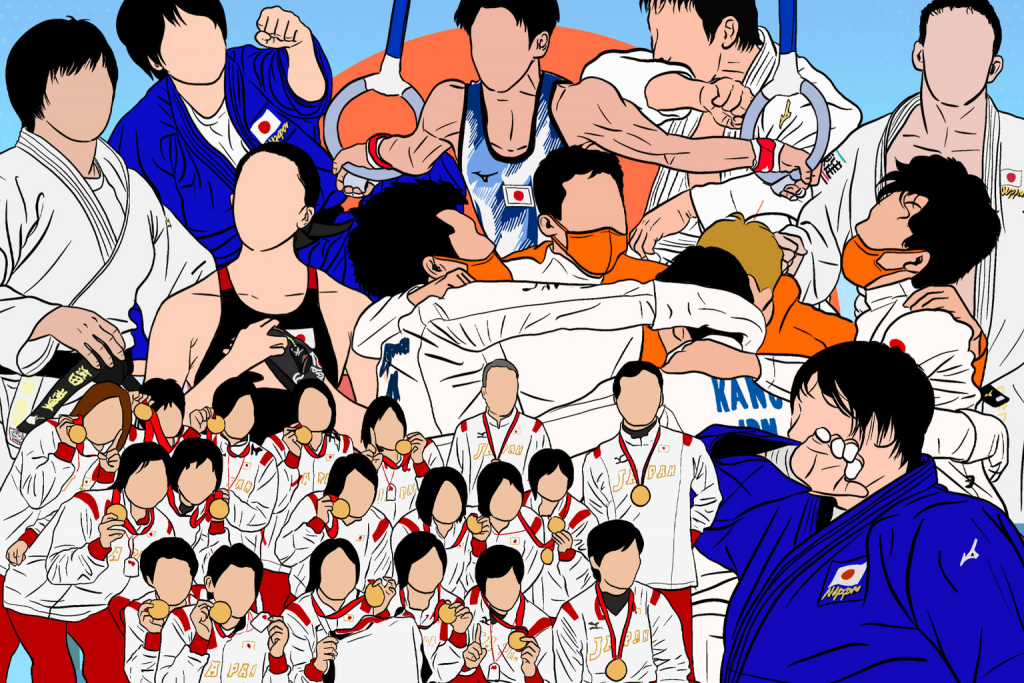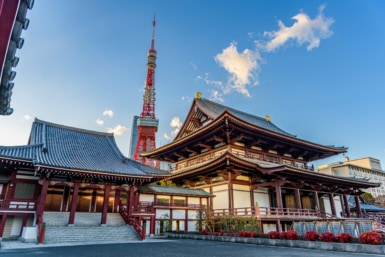Before Tokyo 2020, Japan’s record haul of gold medals at the Olympics was 16, a total achieved both in 1964 and 2004. At this year’s event, that number was surpassed in the first week. Here, in the second in our short series looking at Japan’s gold medalists, we focus on days four to seven. As with the opening three days, most of the hosts’ successes came at the Budokan in judo. Yui Ohashi also topped the podium for the second time in the pool, the softball team defended their crown from 2008 and gymnast Daiki Hashimoto proved he is the true heir to Kohei Uchimura in the men’s all-around event. The most surprising success came in the men fencing épée team event.
Takanori Nagase — Men’s Judo -81kg
In his fifth year of elementary school Takanori Nagase was defeated by Naohisa Takato in an under 40kg judo match at a national tournament. He lost again to the same opponent the following year and the pair have followed similar paths since, albeit in different weights. They’ve both won numerous international titles and lost their quarter-final bouts at the 2016 Olympics. They managed to pick up bronze medals through the repechages, but ultimately left Rio disappointed. They were determined to make up for that in Tokyo, though Nagase’s preparations were derailed in 2017 when a ligament tear put him out of action for more than a year.
Takato did his bit, winning Japan’s first gold on day one. Nagase’s turn came three days later. After defeating world champion Matthias Casse from Belgium in the semi-final, he then faced Iranian-born Saeid Mollaei. Much of the focus was on his opponent as he had been exiled from his country after refusing to forfeit a bout to avoid facing Israeli judoka Sagi Muki in 2019. Representing his adopted country of Mongolia, a victory for Mollaei would have been one of those historic Olympics stories. Nagase, however, proved too strong. Just before the two-minute mark into the golden score, the Japanese man executed a tai-otoshi (body drop) to claim gold.
https://www.youtube.com/watch?v=pZg0s8N08yY
Softball
The last time softball was included at the Olympics in 2008, Yukiko Ueno was the name on everyone’s lips. She threw a remarkable 413 pitches in two days to help Japan become the first team to stop America winning gold in the sport. Thirteen years on and while she may no longer be quite as prolific, she remains an indispensable member of the national team. In the final, once again against the US, she pitched the first five innings, allowing just two hits. Miu Goto, 19 years Ueno’s junior, was then expected to see things out for the final two innings as had been the case in previous matches.
The 20-year-old, who’d been the hero in the group game against Mexico, appeared nervous and her pitches were flattening. Coach Reika Utsugi, who played with Ueno at the 2004 and 2008 Games, decided to call the veteran back for the seventh innings under the re-entry rule. She didn’t let her down, closing the game out for the hosts who led 2-0 through Mana Atsumi’s run-scoring infield hit in the fourth and Yamato Fujita’s RBI single in the fifth. Unfortunately, there will be no softball in Paris. However, there is hope that it will return for the Los Angeles Games in 2028.
Yui Ohashi — Swimming 200m Individual Medley
So good, we’re featuring her twice. Following her triumph in the 400m Individual Medley (IM), Yui Ohashi swam to victory in the 200m IM race too and became the first Japanese woman to win two Olympic gold medals at a single Summer Olympics. Quite the feat. She wasn’t a favorite for either race but was considered a dark horse after some impressive performances at the World Championships. That included a second-place finish in the 200m IM behind Hungary’s Katinka Hosszú in 2017. She would have had another silver medal two years later had she not been disqualified for two dolphin kicks during the breaststroke pullout. In the end, she had to settle for a bronze in the 400m IM.
The disqualification had a negative impact on her mental health. In the previous article, we spoke about Ohashi’s struggles with her physical condition prior to her anemia diagnosis. This was a different, but equally troubling issue she had to overcome. “I had times when I wanted to give up swimming but I learned to accept it and turned it into a strength,” she said at a press conference in 2019. In Tokyo, we saw that strength in abundance. She seemed to thrive off the pressure of a home Olympics and produced two very special results.
https://www.youtube.com/watch?v=Oz_TvKWHIgQ
Chizuru Arai — Women’s Judo -70kg
You often hear about Olympians who immediately fell in love with their sport the first time they tried it. That wasn’t the case with Chizuru Arai. When her older brother joined a judo club in her neighborhood, she thought she’d give it a try too. A kindergarten student at the time, it wasn’t what she was hoping for. Surrounded by older females, she got scared and quit after the first day. Fortunately, the club leader managed to persuade her to give it another go. Arai returned in her first year of elementary school and would go on to become the world junior champion at 19.
Her biggest disappointment in the sport came in 2016 when Haruka Tachimoto defeated her for the only slot in the -70kg category at the Olympics. The Saitama-prefecture native was forced to watch from home as her compatriot won gold in Rio. In Tokyo, though, it was Arai’s chance to shine. She was a strong favorite going into the competition having won world titles in 2017 and 2018. Even a shock third round loss at the 2019 World Championships did little to dampen the enthusiasm. After comfortably getting through the qualifying rounds, she then defeated Austria’s Michaela Polleres in the final with an outer leg trip in regulation time.
https://www.youtube.com/watch?v=1XqZCQCeqkw&t=124s
Daiki Hashimoto — Gymnastics All-Around
There was disappointment for the host nation on the opening weekend as ‘King’ Kohei Uchimura fell from the horizontal bar. It was a sad way for one of the greatest gymnasts of all time to bow out. Yet, things move very quickly at the Olympics and within a few days, the focus switched to a new local gymnastic hero. Daiki Hashimoto showed in the team event why he’s seen as the heir apparent to Uchimura. Up last on the high bars, his phenomenal performance so nearly won Japan gold. Sadly for the hosts, a superb display by Nikita Nagornyy on the floor gave the ROC the narrowest of victories. In the all-around event there would be no near-miss.
Hashimoto was third after five of the six apparatus had been completed. China’s Xiao Ruoteng led the way, though his final score of 14.066 gave the last two competitors a chance. With Nagornyy failing to overhaul him, Hashimoto needed 14.534 on the high bar to top the podium. The tension was palpable, yet Hashimoto looked calm. Executing an extremely difficult routine with grace, he scored 14.534. Japan had a new gymnastic king. Unfortunately, the Japanese man was targeted by online abusers who felt the scoring was unfair. “I’m sorry my performance led to controversial judging on a stage like the Tokyo Olympics,” he wrote on Instagram.
https://www.youtube.com/watch?v=Hak5aqzMGBo
Shori Hamada – Women’s Judo -78kg
“I’m still in disbelief, but I’m really happy,” said Shori Hamada as she became Japan’s seventh judoka to top the podium at Tokyo 2020. “During the matches, it felt the same as any other international competition. But it really felt special when they gave me the gold medal.” A first-class lieutenant in the self-defense forces (SDF), Hamada was a relatively late bloomer to the sport of judo. Though she showed promise during her student days, she didn’t challenge for international titles until her mid-twenties. Making up for lost time, she quickly became one of the most feared competitors in the -78kg category.
Hamada won her first world title in Baku, Azerbaijan in 2018 aged 28. She followed that up with a silver the following year in Tokyo. On that occasion, she was defeated in the final by Madeleine Malonga. At the same location two years later, the 27-year-old French judoka would once again be Hamada’s opponent in the final. This time it was an Olympic gold medal at stake. Early on in the contest, Malonga attempted a throw that effectively ended her chances. Hamada saw her opportunity and forced her rival into a four-quarter submission for ippon. The 30-year-old had achieved the ultimate prize in judo at her first-ever Olympics.
Aaron Wolf — Men’s Judo -100kg
Five years ago, Aaron Wolf watched from afar as his “senpai” Mashu Baker won gold for Japan in Rio. Having then established himself as one of the finest judokas in the country, the hope was that Wolf could emulate his friend by topping the podium in Tokyo. Though competing in different weights, it almost felt like the baton was being passed on. After all, the pair have so much in common. They were both born in Tokyo to Japanese mothers and American fathers. Their first meeting came at the famed Kodokan Judo Institute established by the sport’s founder Kano Jigoro. In the coming years, they developed a close relationship at Tokai University Urayasu Senior High School despite being in different grades.
They would go on to win many medals at international tournaments, though the fact that Wolf managed to secure both national and world titles perhaps gives him the edge over his senior judoka. The one thing missing from his resume was an Olympic medal. At least it was until last Thursday. Following an impressive victory over Georgia’s Varlam Liparteliani in the last four, he came up against South Korea’s Cho Gu-ham in the final. A grueling encounter went into golden score before Wolf settled it with an ouchi-gari (large inner reap) throw. Japan had its first Olympic champion in the -100kg division since current head coach Kosei Inoue in 2000.
https://www.youtube.com/watch?v=7Dv2PS9UazU
Akira Sone — Women’s Judo +78kg
Akira Sone was just eight when Idalys Ortiz made her Olympic debut in Beijing. The Cuban won a bronze and followed that up with a gold in London four years later. By that point, Sone had garnered a reputation as a potential future star in the sport thanks to her performances at elementary school. She further enhanced that reputation through her teenage years before meeting Ortiz for the first time in a Grand Prix final in Osaka in 2018. The more experienced judoka won over the high school student on that occasion, but Sone soon had the edge over her rival.
The following year, the Japanese woman defeated Ortiz in the final of her first World Championship. It was the same outcome when they met at the Osaka Grand Slam three months later. That victory guaranteed the teenager a spot on the Japan team for Tokyo 2020. Determined to seize her opportunity, Sone powered through the qualifying rounds, winning each bout by ippon. Waiting in the final was once again Ortiz. Despite being 10 years younger and 10cm shorter, the Fukuoka Prefecture-native was aggressive from the get-go. In the end, Ortiz was penalized twice for non-combativity and then for a false attack. Japan had its ninth judo gold of the Games, breaking the record set in 2004.
Fencing — Men’s Team Épée
Japan’s not exactly known as a fencing powerhouse. Prior to Tokyo 2020, they had won just two medals in a sport that has been contested at every Summer Games since the first international Olympics in 1896. Going into the men’s team épée, expectations weren’t particularly high of improving on that record as they were the second-lowest ranked team in the tournament. Also, in the individual competition, Koki Kano and Kazuyasu Minobe failed to get past the round of 16 while Masaru Yamada was eliminated at the quarter-final stage. What’s more, they were drawn against favorites France in the quarter-finals.
Remarkably, Kano sealed a dramatic 45-44 victory for the hosts in the ninth match against the French. The semi-final against Korea was slightly more comfortable with Japan winning by seven points. The gap in the final was even bigger as Kano, Yamada and Satoru Uyama defeated the ROC 45-36. It was once again left to Koki to seal the win against the second-ranked épée fencer Sergey Bida. Minobe was the other member of the squad but didn’t feature in the final. The four men had made history as the first fencers to win gold for Japan at the Olympics. They also secured the host nation its 17th gold of Tokyo 2020, already a record haul after just seven days of competition.
*Feature image by Rose Vittayaset
Updated On August 6, 2021








